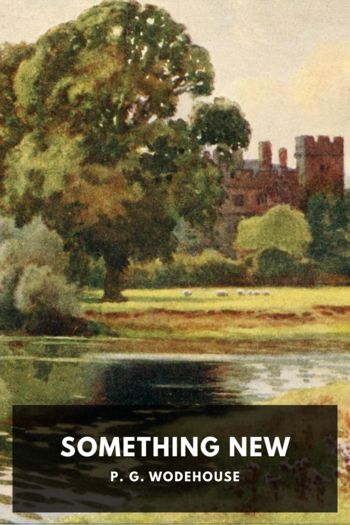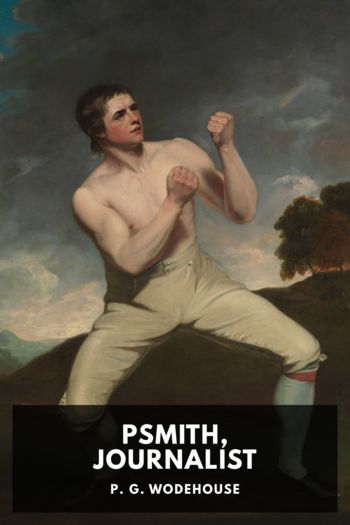Leave It to Psmith by P. G. Wodehouse (best ereader for academics TXT) 📕

- Author: P. G. Wodehouse
Book online «Leave It to Psmith by P. G. Wodehouse (best ereader for academics TXT) 📕». Author P. G. Wodehouse
“Yes. Susan, her name is.”
“Susan? Susan? That sounds all right. Just the name a real housemaid would have.”
“Did you ever,” demanded Freddie earnestly, “see a real housemaid sweep under a bureau?”
“Does she?”
“Caught her at it in my room this morning.”
“But isn’t it a trifle farfetched to imagine that she is a detective? Why should she be a detective?”
“Well, I’ve seen such a dashed lot of films where the housemaid or the parlourmaid or whatnot were detectives. Makes a fellow uneasy.”
“Fortunately,” said Psmith, “there is no necessity to remain in a state of doubt. I can give you an unfailing method by means of which you may discover if she is what she would have us believe her.”
“What’s that?”
“Kiss her.”
“Kiss her!”
“Precisely. Go to her and say, ‘Susan, you’re a very pretty girl …’ ”
“But she isn’t.”
“We will assume, for purposes of argument, that she is. Go to her and say, ‘Susan, you are a very pretty girl. What would you do if I were to kiss you?’ If she is a detective, she will reply, ‘How dare you, sir!’ or, possibly, more simply, ‘Sir!’ Whereas if she is the genuine housemaid I believe her to be and only sweeps under bureaux out of pure zeal, she will giggle and remark, ‘Oh, don’t be silly, sir!’ You appreciate the distinction?”
“How do you know?”
“My grandmother told me, Comrade Threepwood. My advice to you, if the state of doubt you are in is affecting your enjoyment of life, is to put the matter to the test at the earliest convenient opportunity.”
“I’ll think it over,” said Freddie dubiously.
Silence fell upon him for a space, and Psmith was well content to have it so. He had no specific need of Freddie’s prattle to help him enjoy the pleasant sunshine and the scent of Angus McAllister’s innumerable flowers. Presently, however, his companion was off again. But now there was a different note in his voice. Alarm seemed to have given place to something which appeared to be embarrassment. He coughed several times, and his neatly-shod feet, writhing in self-conscious circles, scraped against the wall.
“I say!”
“You have our ear once more, Comrade Threepwood,” said Psmith politely.
“I say, what I really came out here to talk about was something else. I say, are you really a pal of Miss Halliday’s?”
“Assuredly. Why?”
“I say!” A rosy blush mantled the Hon. Freddie’s young cheek. “I say, I wish you would put in a word for me, then.”
“Put in a word for you?”
Freddie gulped.
“I love her, dash it!”
“A noble emotion,” said Psmith courteously. “When did you feel it coming on?”
“I’ve been in love with her for months. But she won’t look at me.”
“That, of course,” agreed Psmith, “must be a disadvantage. Yes, I should imagine that that would stick the gaff into the course of true love to no small extent.”
“I mean, won’t take me seriously, and all that. Laughs at me, don’t you know, when I propose. What would you do?”
“I should stop proposing,” said Psmith, having given the matter thought.
“But I can’t.”
“Tut, tut!” said Psmith severely. “And, in case the expression is new to you, what I mean is ‘Pooh, pooh!’ Just say to yourself, ‘From now on I will not start proposing until after lunch.’ That done, it will be an easy step to do no proposing during the afternoon. And by degrees you will find that you can give it up altogether. Once you have conquered the impulse for the after-breakfast proposal, the rest will be easy. The first one of the day is always the hardest to drop.”
“I believe she thinks me a mere butterfly,” said Freddie, who had not been listening to this most valuable homily.
Psmith slid down from the wall and stretched himself.
“Why,” he said, “are butterflies so often described as ‘mere’? I have heard them so called a hundred times, and I cannot understand the reason. … Well, it would, no doubt, be both interesting and improving to go into the problem, but at this point, Comrade Threepwood, I leave you. I would brood.”
“Yes, but, I say, will you?”
“Will I what?”
“Put in a word for me?”
“If,” said Psmith, “the subject crops up in the course of the chitchat, I shall be delighted to spread myself with no little vim on the theme of your fine qualities.”
He melted away into the shrubbery, just in time to avoid Miss Peavey, who broke in on Freddie’s meditations a moment later and kept him company till lunch.
IIIThe twelve-fifty train drew up with a grinding of brakes at the platform of Market Blandings, and Psmith, who had been whiling away the time of waiting by squandering money which he could ill afford on the slot-machine which supplied butterscotch, turned and submitted it to a grave scrutiny. Eve Halliday got out of a third-class compartment.
“Welcome to our village, Miss Halliday,” said Psmith, advancing.
Eve regarded him with frank astonishment.
“What are you doing here?” she asked.
“Lord Emsworth was kind enough to suggest that, as we were such old friends, I should come down in the car and meet you.”
“Are we old friends?”
“Surely. Have you forgotten all those happy days in London?”
“There was only one.”
“True. But think how many meetings we crammed into it.”
“Are you staying at the castle?”
“Yes. And what is more, I am the life and soul of the party. Have you anything in the shape of luggage?”
“I nearly always take luggage when I am going to stay a month or so in the country. It’s at the back somewhere.”
“I will look after it. You will find the car outside. If you care to go and sit in it, I will join you in a moment. And, lest the time hangs heavy on your hands, take this. Butterscotch. Delicious, and, so I understand, wholesome. I bought it specially for you.”
A few minutes later, having arranged for the trunk to be taken to the castle, Psmith emerged from the station and found Eve





Comments (0)